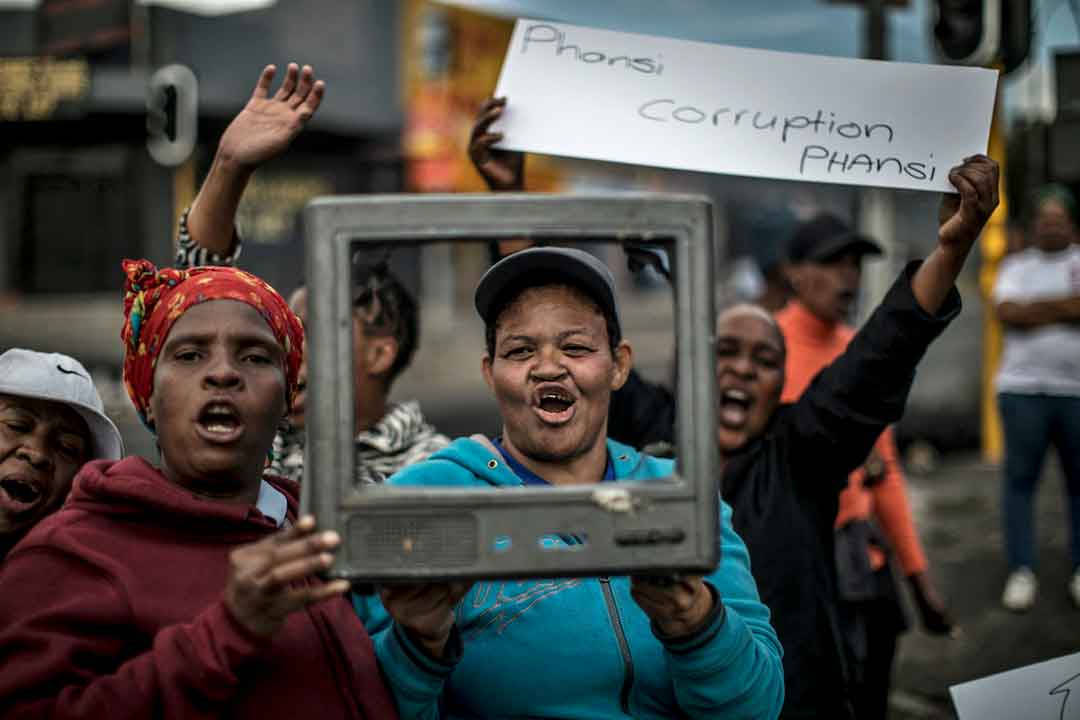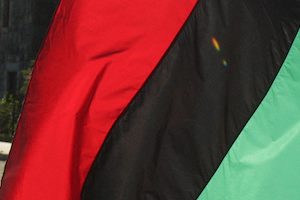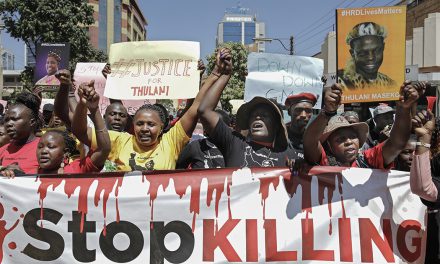The impact of municipal maladministration and corruption on SA’s local government elections
In a briefing to the parliamentary Standing Committee on Public Accounts and the Standing Committee on the Auditor-General on the 22 June 2021, Auditor-General (AG) Tsakani Maluleke presented a report on the audit outcomes in South Africa’s municipalities. Local government is essential to the delivery of basic services. The findings of the AG’s report, the most reliable indicator of the state of governance at this level, raise critical questions about the degree of good management in many of the country’s municipalities. The report highlights the pervasive malfeasance and corruption in local government, and its findings compound concerns around the inability of state institutions, particularly at local level, to hold both elected and appointed public officials to account for poor governance.

A woman holds a banner reading “down with corruption” as they shout slogans and gesture, in Johannesburg, on April 23, 2019 during a protest against the lack of service delivery or basic necessities such as access to water and electricity, housing difficulties and lack of public road maintenance. – Police and protesters exchanged volleys of teargas and stones in Johannesburg on April 23, 2019 after a suburb erupted into protest over public services ahead of polls on May 8. Dozens of residents in the working class Turffontein suburb blocked the main road through ward 55, burning tyres, mattresses and tree branches over allegedly unfair allocation of nearby new social housing. (Photo by MARCO LONGARI / AFP)
Municipalities generate income from different sources, which can be grouped into two broad categories. The first is via property rates from home and landowners, service charges, water, electricity, sanitation, refuse removal, traffic fines, penalties for contraventions of by-laws, and overdue payments of services. The second mainly includes fiscal transfers or grants from other spheres of government. As such, the substantial flows of money that municipalities are responsible for makes this sphere a very lucrative source of finance for corrupt actors. Poor financial management and capacity, and a lack of adequate internal control measures coupled with poor political leadership and political interference, invariably provide fertile ground for stealing from the public purse in municipalities. For instance, the Dr Ruth Segomotsi Mompati District Municipality (North-West) received a disclaimer from the AG’s findings for not accounting for R582-million spent of the R697-million in its bank accounts. This municipality is notorious for such transactions. One particular transaction, fraught with financial irregularities and fraud, is an advance payment to one supplier to the tune of R16.1 million on 15 December 2020, the last reporting day for the year before the festive break, for no work done.
In many previous instances, the AG has raised concerns about pervasive mismanagement of public funds, which create operational challenges and service delivery problems in many municipalities across the country. The finance minister also bemoaned the crisis in this year’s budget vote speech, where he mentioned that many municipalities are experiencing financial distress due to mismanagement. In addition, the courts ordered national government to intervene in one municipality over its economic and service delivery failures. Despite this, there has not been sufficient political will and urgency to effect consequence management where mismanagement is evident, and remedial action for reform towards good governance. This problem of mismanagement highlights the salient issue of corruption which has been eroding local municipalities for decades. It is critical to take the issue seriously, ahead of October’s local elections. Below are some key findings from the AG’s presentation.
A summary of the Auditor-General’s presentation:
- Only 27 municipalities out of 257 across the country achieved clean audits for the 2019 -2020 financial year. This list includes only one Metropolitan municipality, namely the city of Ekurhuleni.
- In the past year, 246 municipalities incurred irregular expenditure to the tune of R26bn. While this represents an overall improvement of R6 billion from the R32 billion figure reported last year, it remains significant. This is especially the case when we consider how over the past 10 year period, a total of over R186 billion has vanished from municipalities as a result of irregular and wasteful expenditure.
- Worth zooming into are the 22 worst performing municipalities that are in a chaotic state; they lack basic controls and do not exhibit any financial transparency. Cumulatively, these municipalities cannot account for how they spent almost R5.5 billion they received from the national fiscus.
- Perhaps more telling was the response to the COVID-19 pandemic by South African municipalities that have mismanaged funds and contracts and failed to follow basic governance processes. Procurement was characterised by irregularities, mismanagement, and outright corruption. For instance, through uncompetitive and unfair pricing, inadequate quality services, or payment for services that were not provided. A notable example is one unnamed Eastern Cape municipality that bought a car for its mayor with funds meant for the emergency procurement of water and sanitation services to mitigate the impact of the COVID-19 pandemic.
Perhaps what is essential to grasp is what was not explicitly said, particularly the devastating cumulative opportunity cost of mismanagement. The human impact drives these points home, especially in these worst-run municipalities where the money could have built many houses, electrified communities, and provided water and sanitation, amongst other public goods that are lacking, and improved preparation for disasters such as floods, drought or even COVID-19.
What happens when thieves sit at the dinner table
Discussions in public discourse about the African National Congress (ANC), which has enjoyed unfettered political hegemony for 27 years in South Africa, is informed mainly by the dynamics at the national level. To a large extent, emphasis on the so-called balance of power, and extensive intraparty competition along factional lines, have meant that the graft at the highest levels has been aired publicly in press conferences. The Zondo Commission, important as it is, inadvertently maintains this point of focus. This has meant the neglect of grassroots corruption within the party, which is less publicised and receives less scrutiny. In this regard, there have been some exceptions, notably the indictment of the former mayor of the eThekwini Metropolitan Municipality, Zandile Gumede. She was embroiled in the R320 million Durban Solid Waste (DSW) corruption, fraud and racketeering case along with her co-accused. Nevertheless, despite the more than 2000 charges against her by the National Prosecuting Authority, she was rewarded with a deployment as an ‘Honourable’ member of the KwaZulu-Natal provincial legislature, a position she enjoys to date.
The point must also be made that corruption is not unique to the ruling party. Corrupt practices also occur in opposition run municipalities. In 2016, in the Democratic Alliance (DA)-led Tshwane Metropolitan Municipality, Marietha Aucamp was questionably appointed as the chief of staff, a position in which she earned R1.2 million per year without declaring that she did not have the required qualifications.
This form of patronage was also apparent within the Johannesburg Metropolitan Municipality, where the quid pro quo relationship between Herman Mashaba’s DA-led administration existed with the support of the Economic Freedom Fighters (EFF). This relationship saw the awarding of a contract and dodgy payments for maintaining a vehicle fleet by the city. The proceeds flowed to accounts and individuals with proximity to the EFF. Another notable case that follows a similar modus operandi of different parties acting in concert is the plundering of VBS Mutual Bank. Politically connected individuals used their influence to provide the bank with a steady flow of municipal deposits, which financed their expensive lifestyles at the expense of the depositors. The most notable are prominent members and supporters of the opposition EFF. The VBS Mutual Bank case has illustrated how opposition parties are not immune to this problem of flexing their political muscle expediently for financial benefit.
The cost of corruption
When wasteful expenditure occurs, those in positions of authority live in luxury from the proceeds, while citizens continue to experience hardships. This stems from the fact that wasteful expenditure has a dire impact on governance. In the short and long term, it fuels service delivery failure. As a result, the electorate is deprived of essential water and electricity, and safe municipal roads. The impact not only extends to citizens, but also to the functioning of businesses and their ability to remain profitable. Perhaps this is best illustrated by the inability of many municipalities to pay Eskom and the water boards, leading to rolling electricity and water cut-offs respectively. In turn, businesses find it difficult to invest and operate in these localities. One case in point is the recent decision by Clover to relocate its production plant from Lichtenburg, a town in the North West province, due to “ongoing poor service delivery” such as disruption of water supply and dire quality of roads.
Recommendations on what is to be done to resolve these systemic issues.
Considering the AG’s diagnosis of the issue of maladministration ahead of the local government elections, resolving the issue of corruption in municipalities needs to become an urgent consideration. Amongst others, key state institutions at a national level, political parties, and citizens can intervene in specific ways:
- Strengthening public institutions’ response to maladministration and corruption – The amendments to Public Audit Act (PAA) were signed into law on 18 November 2018 to enhance the powers of the AG’s office. This was aimed at implementing effective consequence management and remedial action when material irregularities occur, i.e., fraud, non-compliance and contravention of legislation and other irregular misuses of public resources that result in financial loss. Through these amendments, accounting officers should face the consequences of wrongdoing. This is one vehicle that can be used to address the issue of corruption promptly. Besides relying on the diagnosis and remedial action by the AG, the capacity constraints of other critical Chapter Nine institutions, the National Prosecuting Authority and other organs in the criminal justice system, must be resolved by appointing competent and skilled people to key positions, as well as strengthening their investigative and punitive abilities. This will go a long way as a government intervention to resolve the problems of maladministration and corruption associated with the management of state institutions.
- Dealing with corruption associated with political parties and their leadership – A timely intervention ahead of the local government elections in this regard is the Political Party Funding Act. The Act, which came into effect on 1 April 2021, will see the first quarterly disclosures – the sources and amounts of private funding received by political parties – being made available publicly. A potential game-changer, this Act brings transparency to the interests of political representatives and private donor, provided that the vested interests of detractors of transparency do not mitigate its effects by devising alternative paths to continue their corruption. The Act can go a long way towards entrenching accountability. This will be achieved by preventing much of the influence that these often opaque funders have had in how municipalities-ministries are governed, primarily regarding resource allocation. Additionally, some of the long-standing shortcomings that breed corruption, such as uncompetitive and often unfair procurement processes, will be resolved. As a test, the electoral campaigns, funding, manifestos and general path to the elections for political parties is a process that must ideally be anchored in the principles of good governance, the rule of law, and respect for accountability. This will be seen as a statement and commitment against the corrupting influence of personal interests in municipalities which will be meaningful before, during, and after the elections.
- How citizens can strengthen and exercise their agency against poor governance – Instead of resorting to apathy due to the challenges outlined above, increased engagement with political parties and demands for accountability by citizens ahead of the elections presents an opportunity for citizens to hear what they have to say about corruption in municipalities. They should ask tough questions on whether their chosen leaders bring innovative ways to stem the tide against the phenomenon of deterioration, poor governance and the breakdown of the public compact as mentioned above. Citizens should exercise their civic duty, assert their rights, and articulate their grievances through the ballot in the upcoming October elections. An increased voter turnout, which opts for accountable leadership, ethical representation which promotes public interests, trust, and good is what is now required.
Stuart is a Researcher in the Governance Delivery and Impact programme at Good Governance Africa. He holds a Master of Arts degree in Security and Strategic Studies from the University of Pretoria. His dissertation explored the linkages between marginalisation and insecurity, looking at the securitisation of service delivery protests in South Africa. Before joining Good Governance Africa, He was a Junior Research Fellow with the Centre for Law and Society at the University of Cape Town. Before that, he worked as a research consultant at the Institute of Security Studies with the Justice and Violence Prevention Programme and as a Junior Lecturer for the Department of Political Sciences at the University of Pretoria.








